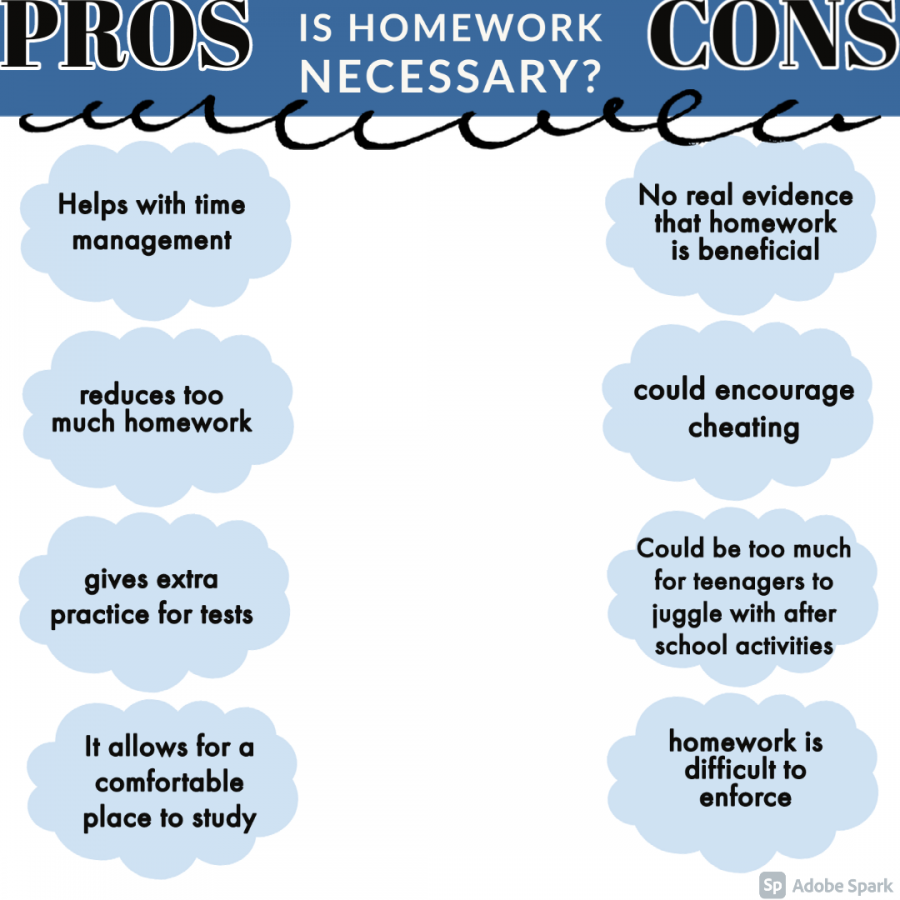The purpose of homework
November 1, 2021
While working tirelessly through material for each class, students ask the age old question, ‘Is this work really necessary?’ The purpose of homework is to have students practice material they learn in class, outside of school. This extra practice gives students the opportunity to master their skills over certain subjects and be ready for the next school day.
Homework can help students prepare for assessments and can also help parents understand and help their students with what they’re learning in class. In the article ‘Purpose, Public Attitudes toward Homework, The Positive and Negative Effects of Homework, Extensiveness of Homework’ author Harris Cooper explains how the use of homework can be beneficial not only for the student, but also the parent.
“Homework can be used to (1) establish communication between parents and students,”. With homework being brought home each night, it gives a chance for insight on how each child learns and the parent can become a part of the learning process by engaging with their child,” said Cooper.
There are many pros and cons of homework. With all the different learning styles, homework could be way more beneficial for one student than another . Homework can teach time management by giving students deadlines they have to work to meet and it can also reduce screen time. The use of phones and other technologies can cause distractions from homework, but in time the student will take responsibility for their learning and put the work first before screen time. Homework builds confidence in a student by them being able to work through problems on their own. This gets the student for test day
Though there are many positives to homework, there are some negatives that can be concerning. Although homework could be helping students, there is no real evidence to prove that it creates improvements. Homework also may encourage cheating. Students are way more likely to cheat when there isn’t a teacher right there watching them. Homework also just adds to their already packed schedule. A student’s schedule consists of seven hours at school, any after school activities, and then they have homework each night. Though the homework may act as extra practice, there are no hard facts that show the homework is beneficial for all students
Students can be given a great deal of homework during the school week. Some classes give more homework than others. Junior Mackynzie Jones says what classes give her the majority of her homework,
“Algebra 2 or lit and lang” she goes on to say, “For math homework is beneficial since I can get practice doing the new material before the test and IB lit and lang, sometimes it’s beneficial because if its writing then yes since I don’t have to rush but if its reading then no since we usually read them in class.” Jones said.
Homework can take up big chunks of a student’s time. Students have to work to find the balance between school and home. Freshman Chloe Minor discusses how homework takes up her time,
“ Homework takes up the majority of my after school time, I will spend 45 minutes each class so it ends up being up to 3 hours of homework or so. Plus studying and any missing work I have.” Minor Said
Cheating at home is much more tempting than it would be to cheat at school. Senior Tyler Day had an interesting take on if homework was easy to cheat on or not.
“Homework is very easy to cheat but it won’t help on your tests,” Day said.
Some students find homework more beneficial than others and it takes time to figure out the best way to get all your homework done and still have time for yourself. Homework should be used simply as a review or if it is helpful for your certain learning style. High School students are working away 7 hours a day at school, homework shouldn’t be something they always have to worry about as soon as they get home.




